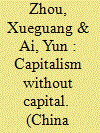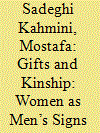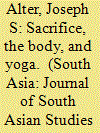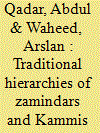| Srl | Item |
| 1 |
ID:
141095


|
|
|
|
|
| Summary/Abstract |
Situated in an agricultural township in northern China, this study examines the rise of produce markets in rural China in the face of a chronic shortage of financial capital. Drawing on theoretical ideas in economic sociology, we explicate the mechanisms of gift exchange and credit taking and the conditions under which these mechanisms are used to mobilize financial capital and to facilitate market transactions in the absence of financial capital. We illustrate these issues and ideas using our fieldwork research on different produce markets and entrepreneurial activities.
|
|
|
|
|
|
|
|
|
|
|
|
|
|
|
|
| 2 |
ID:
162789


|
|
|
|
|
| Summary/Abstract |
This essay investigates the Iranian film ʿArus-e Ātash, directed by Khosrow Sināʾi in 1999, through the lens of gender studies. In doing so, it employs Claude Lévi-Strauss’ theory of kinship and elementary structures in order to create a context for the social structure of ʿashira as the prevailing unit of society among Khuzestāni Arabs of Iran. The significance of gift exchange as the predominant form of making alliances, as well as the position of women as the nucleus of these exchanges, is further discussed to shed light on the different socialization of male and female individuals in the ʿashira. Using Lévi-Strauss’ ideas in conjunction with the gender feminism of Kate Millett and Catharine A. MacKinnon, the study explores how women in primitive societies have the dual function of being the men’s property on an objective level as well as the means for alliance-making on a subjective one—a sign and a value at the same time. The essay concludes that men can also be considered as the victims of the patriarchal system since it creates a cultural image of men imbued with excessive masculinity that they may not be able live up to.
|
|
|
|
|
|
|
|
|
|
|
|
|
|
|
|
| 3 |
ID:
088012


|
|
|
|
|
| Publication |
2009.
|
| Summary/Abstract |
This paper examines the broad range of informal land transactions and arrangements migrants are entering into with customary landowners to gain access to customary land for export cash cropping in the oil palm belt of West New Britain, Papua New Guinea. Whilst these arrangements can provide migrants with relatively secure access to land, there are instances of migrants losing their land rights. Typically, the land tenure arrangements of migrants with more secure access to land are within a framework of property rights for social inclusion whereby customary landowners' inalienable rights to land are preserved and the 'outsider' becomes an 'insider' with ongoing use rights to the land. Through socially embedding land transactions in place-based practices of non-market exchange, identities of difference are eroded as migrants assume identities as part of their host groups. This adaptability of customary land tenure and its capacity to accommodate large migration in-flows and expanding commodity production undermines the argument common amongst proponents of land reform that customary tenure is static and inflexible. Before such claims are heeded, there must be more detailed empirical investigations of the diverse range of land tenure regimes operating in areas of the country experiencing high rates of immigration.
|
|
|
|
|
|
|
|
|
|
|
|
|
|
|
|
| 4 |
ID:
114017


|
|
|
|
|
| Publication |
2012.
|
| Summary/Abstract |
In most general terms, hathayoga involves the internalisation and embodied literalisation of the Vedic fire sacrifice. Reflecting on the place of sacrifice in anthropological theory, and on the way in which sacrifice structures the relationship between humans and gods in terms of gift obligations, this paper explores the theoretical implications of hathayoga's embodied literalisation of a profoundly symbolic act. Although similar to various forms of ascetic renunciation, hathayoga is unique, it will be argued, in being structured as the physiological antithesis of religious ritual. Self-realisation based on the internalised yajna sacrifice undermines the binary structure of the sacred and the profane and makes god irrelevant. This raises theoretical questions concerning the social significance of a ritual that is anti-social on a number of different levels.
|
|
|
|
|
|
|
|
|
|
|
|
|
|
|
|
| 5 |
ID:
190676


|
|
|
|
|
| Summary/Abstract |
This article challenges the traditional understanding of the role of landownership in rural Punjab in the context of recent socio-economic restructuring of Pakistani society. Based on extensive ethnographic fieldwork of contemporary practices of gift exchange (vartan bhanji) in a village, we argue that the Kammi biraderis, once considered lower class, now assert their elevated socio-economic status through vartan bhanji on important social occasions like marriages. Zamindars now see themselves in competition both with Kammi biraderis and each other for social prestige and superior status, as new claims made by different biraderis challenge traditional hierarchies created through historically structured socio-economic inequalities.
|
|
|
|
|
|
|
|
|
|
|
|
|
|
|
|